---------------------------------------------------------
Sooner or later everyone who raises chickens or is thinking about it needs to answer The Rooster Question. Will you add a rooster to your flock or will you have a girls only coop?
Do you need to have a rooster?
Some people are under the impression you need to have a rooster to get eggs out of your flock. This is not the case. You only need a rooster if you want to produce fertilized eggs to hatch into baby chicks. A hen will release an egg yolk from her ovary approximately every 24 hours. This is a normal function similar to a woman’s reproductive cycles. It will happen whether there is a male around or not.
As the egg yolk travels down the oviduct, the egg white, membrane and eventually the shell are added. If fertilization happens, it must take place in the first 20 minutes of the egg yolk being released. If it is fertilized, the egg could hatch into a chick if properly incubated. If it is not fertilized, there is no chance of the egg hatching a chick. Either way, the egg is perfectly edible and there is no taste difference. From the outside, a fertile and infertile egg would look exactly the same. Only upon cracking the egg open would you be able to tell if the egg if fertilized.
Are fertilized eggs safe to eat? Will there be a chick inside?
Yes, fertilized eggs are perfectly safe to eat. There will not be a baby chick or developing chick inside if you are collecting eggs daily. A fertilized egg needs to be kept at the proper temperature for several hours before it even begins to develop. Even if you have a broody hen keeping those freshly laid fertile eggs warm, it would take 3-4 days before the first visible signs of development.
A fertile egg takes about 21 days to hatch, but only under the proper temperature. If you had a hen sitting on a fertile egg for 2 days and then you collected the eggs and put them in your refrigerator (or even just left them on your counter), the embryo would stop developing. You will not crack open a 21 day old egg from your fridge and find a baby chick peeping inside no matter what cartoons tell you! Your best bet for avoiding any development in your eggs when a rooster is around is to simply collect your eggs every day. click here to read more about the difference in fertilized vs unfertilized eggs

If you don’t need a rooster for eggs why would you get one?
The first and most obvious reason is that you want to be able to hatch your own chicks. It’s certainly cheaper than buying chicks from hatcheries and will provide you with all the future chickens you could ask for.
But beyond reproduction, roosters can provide additional benefits to your flock. Roosters are wonderful protectors. Willing to die to keep his girls safe from harm, he will go after any and all threats. When the flock is out free ranging, he will spend most of his time scanning the skies and the horizon for danger.
He will also alert the flock when he has found a particularly tasty treat. He won’t eat it himself, but will call his girls over for the feast. Extra nice roosters will even pick up a treat and bring it over to his favorite girl.
Adding a rooster to your flock will change the dynamics. He will often stop the bickering that can go on among the ladies. The hens will be less stressed knowing there is a rooster around to keep them safe. If you enjoy chicken watching (and what chicken owner doesn’t?) having a rooster around ups the entertainment value. He will dance for the girls by dipping his wing while circling them. There is nothing cuter than watching him find a bug, call the flock over and watch proudly while they eat it. Our roosters have bushy beards and I have seen the girls picking at his beard to clean it. And roosters are just gorgeous! Most have showy tails, long saddle feathers, and big bushy hackle feathers at their neck.
When roosters go bad…
Not all roosters are chocolate and roses though. Sometimes an overzealous roo can hurt the hens during mating. It’s best to have about 10-12 hens for every one rooster so he can spread his …..affections evenly. Speaking of affection, you can expect to see a lot of mating going on in your yard. You might want to prepare children for this sight.
Then there is the crowing. Roosters can crow at all hours… at dawn, at dusk, at noon, at midnight… whenever they feel they have something to say. Crowing is a form of communication. They could be trying to scare off a predator, showing off for his ladies, marking his territory, expressing pride in his flock, greeting the day, just saying hi. There are tons of reasons.
If you have two (or more) roosters you can expect a lot more crowing as they will be trying to out do each other. If you don’t mind the sound of crowing and you don’t have close neighbors then this is not a problem. With no barriers (like trees, houses) a mature rooster’s crow can be heard for miles.
If you have close neighbors or don’t like getting up with the sun, a rooster might not be for you. Keeping your rooster locked in the coop during “quiet hours” can help muffle the sound. My town doesn’t have rooster rules, but many towns around us say they must be cooped between 7 PM and 7 AM. You could also buy a No Crow Collar, a band that restricts the rooster’s ability to crow. click here for tips on researching your town’s rules regarding roosters
If you can minimize disturbances (such as dogs barking, people walking by) your rooster might calm down a bit. But all roosters crow. Generally, Barred Rocks, Orpington, & Salmon Faverolle roosters are known to be calm and quiet. Rhode Island Reds and Leghorns are some of the more typically aggressive roosters. It really is an individual rooster thing however. Some “mean” breeds can produce gentle, quiet roosters and some “gentle” breeds can give you aggressive, loud roosters. In any event, if you are considering a rooster, you should have a plan if your rooster turns out to be a nuisance and you need to get rid of him.
My first rooster
My first rooster Ted was a pretty awesome guy- until he wasn’t. He was an Easter Egger and we got him for free from a fellow chicken owner who raised him from a chick but wasn’t interested in keeping roosters. We brought him home at about 4 months old. His previous owner did a good job getting him used to people. He took great care of his girls and was gentle with them. He made sure everyone got in the coop at night and kept them safe while out in the yard. I would say on average he crowed maybe 3-4 times a day for a couple minutes each time, which is really pretty reasonable.
Right around Ted’s first birthday he started to change however (which is generally when you start having the most problems with roosters as their hormones really kick in). He was challenging me and my husband, sometimes pecking at our feet. He started chasing after our kids any time they were outside. We finally decided it was time for Ted to find a new place to live. We found a local chicken farm that was willing to give him a home.
More Roosters….
A couple of years later we decided to give a rooster another go. This time we started with a day old chick. We got a Salmon Faverolle, a breed well known to be quieter and more docile. His name is Odin (after the Norse god) because of his amazing beard, but he is not really a fierce warrior. We made sure to handle him often as a chick. Odin has been a great addition to our flock. He has a few crowing sessions during the day, nothing excessive, usually just a couple crows. He is quite docile, he gives us a wide berth in the yard and has never once challenged any of the humans. Odin keeps a good eye on the flock when they are out free ranging and is absolutely gorgeous!
We had such good luck with Odin, and our flock had grown to about 20 hens so we decided we should add another rooster. We adopted him at 7 month old- a free rooster found online. Gandalf was a gorgeous bantam grey Silkie. We figured a little bantam wouldn’t be too much trouble. He was quite the feisty guy though! He wasn’t as aggressive as Ted and his smaller size made him a bit more comical than menacing. But you couldn’t turn your back on him. As soon as you did he would run up at you and jump or peck at your legs. We would lock him up whenever visitors would come with children because we didn’t trust him. As more experienced chicken keepers this time around, we managed his behavior the best we could. We all learned to live together fairly well. He was a great protector despite his size. Unfortunately about a year after bringing him home he lost a battle with a hawk while protecting his ladies.
Before Gandalf met his end we discovered that one of the spring chicks we had that year was a roo despite being sexed female at the hatchery. So for a little while we had three roosters at the same time. Luckily this little guy was raised by us from the start and also happened to be another Salmon Faverolle like Odin. The three boys actually got along fairly well. They each had their own group of ladies that were their favorites. The newest rooster, Mr. Darcy, is not quite as friendly as Odin, but he is very respectful of the humans and doesn’t crow much at all.
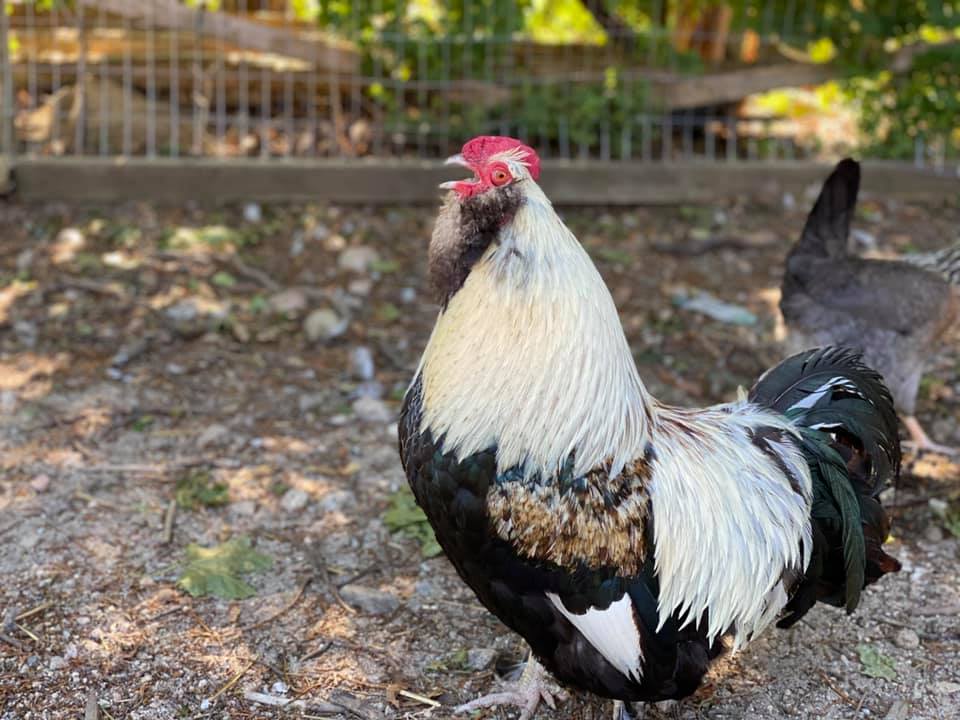

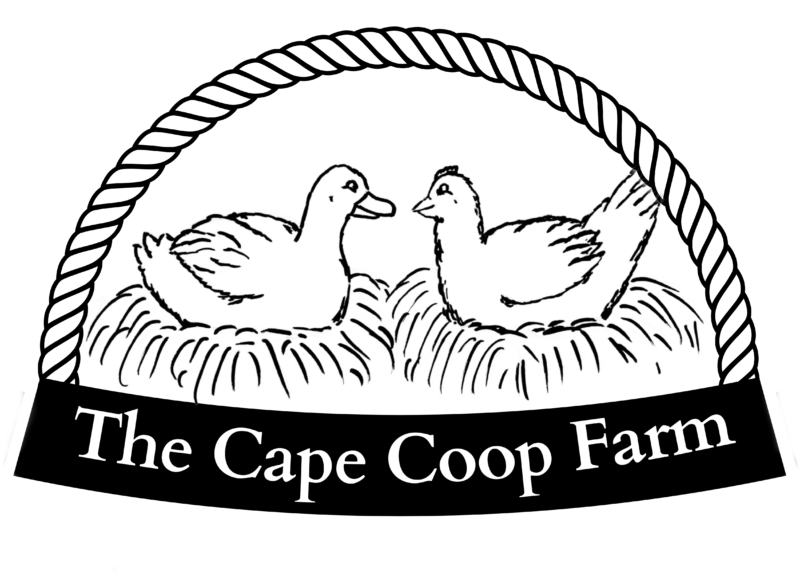


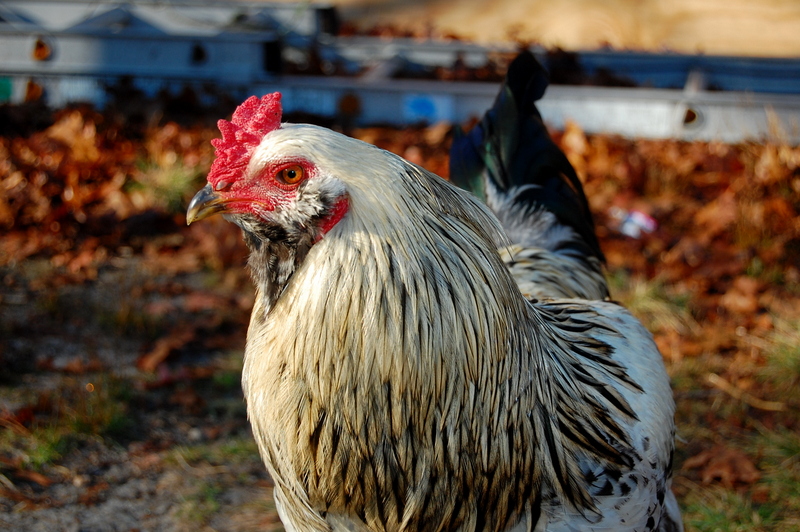
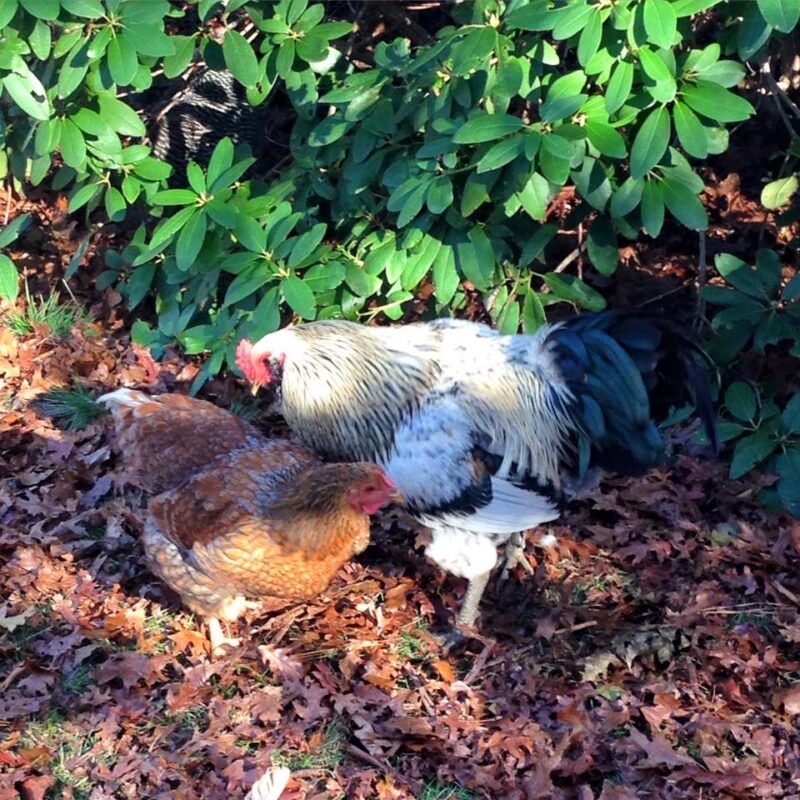

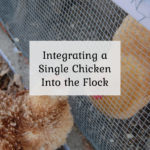
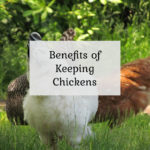

Marion ankney
Thursday 25th of August 2016
Will you get less eggs when you have a rooster and get rid of him?
Liz
Monday 29th of August 2016
I have read in multiple publications that having a rooster around increases the production of the laying hens. I didn't see a noticeable difference when we got our rooster or a noticeable decrease when our rooster left. I don't keep very strict records on egg numbers though! But it stands to reason if getting a rooster increases numbers, getting rid of him would decrease the numbers.
WMH Cheryl
Monday 18th of July 2016
I have actually found that roosters that were hand raised by kids (I.e. "tame roosters") are the ones that usually grow into jerks. Maybe they have less fear of humans? The "wild roosters" that were hatched out by my free range hens have never once attacked me. Just my experience over the years.